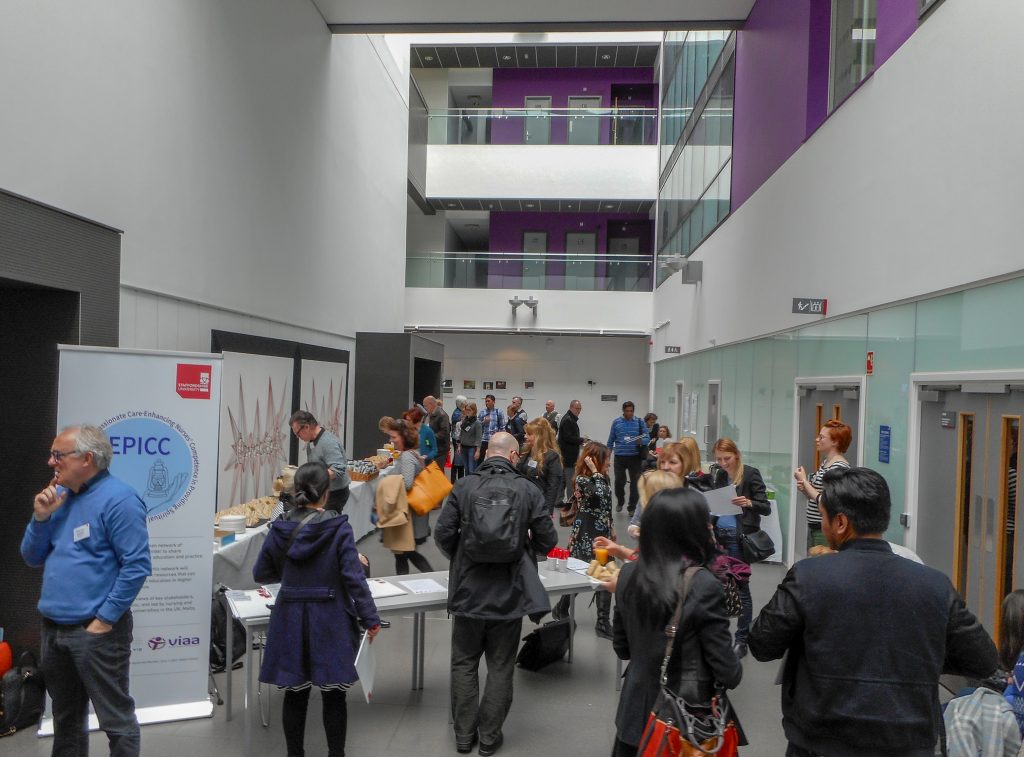Host
Staffordshire University (Staffordshire, United Kingdom).

Purpose
To formally launch and set the foundation the EPICC project, along with preparing the EPICC Strategic Partners and EPICC Participants to work with all the intellectual outputs and project activities.
Aims
- Present findings from the multi-national study of student nurses’/midwives’ spiritual care competencies and identify implications for nursing education, practice and the EPICC project.
- Identify strategies to ensure the significant findings from the study are shared and adopted by nursing and midwifery from within the EPICC Strategic Partners’ and EPICC Participants’ institutions/countries.
- Explore how the findings from the study can be disseminated to inform nursing and midwifery practice locally within EPICC Strategic Partners’ and EPICC Participants’ curricula and more broadly within Europe and beyond.
Programme and resources
Resources from the event such as presentations and videos are available for you to view – follow the links in the table below.
View the full EPICC Conference Programme (Stoke-on-Trent) (PDF file, 364 KB).
| Day 1: Wednesday 19 April 2017 | |
| Time | Activity |
| 13:00-13:20 | Open and welcome. Professor Liz Barnes, Vice-Chancellor of Staffordshire University. |
| 13:20-14:00 | What is the EPICC Project: relevance to nursing and midwifery practice and education? (PPTX file, 4.43 MB) Professor Wilfred McSherry, Staffordshire University, University Hospital of the North Midlands, and Professor Tove Giske, VID specialized University |
| 14:00-14:45 | Presentation of key findings from a multi-national study exploring student nurses/midwives perceived spiritual care competence. (PPTX file, 2.11 MB) Dr Linda Ross, University of South Wales, and Annemiek Schep-Akkerman, Christian University of Applied Sciences Viaa. |
| 15:15-16:30 | Workshop |
1) Review and discuss findings from the multi-national study presented above.
|
|
| 2) Synthesize a shared understanding of what ‘best practice’ in spiritual care education looks like. | |
| 3) Develop an action plan for making this happen. | |
| 4) Feedback from each group – summary of each group’s work to feed into final action plan. | |
| 17:00-18:00 | Meeting of EPICC Strategic Partners and EPICC Participants. Finalise action plan for Participants to take back to their own institutions to support curriculum design and learning and teaching strategies. |
| Day 2: Thursday 20 April 2017 |
|
| 09:00-09:30 | What do we mean by competence in spiritual care? Developing the Spiritual Care Competence Scale. (PPTX file, 508 KB) Professor Rene van Leeuwen, Christian University of Applied Sciences Viaa. |
| 09:30-10:00 | Nurses’ and midwives’ acquisition of competency in spiritual care: A focus on education. (PPTX file, 4.14 MB) Dr Josephine Attard, University of Malta. |
| 10:30-11:00 | The Impact of Pre-registration Nurses’ spirituality education on Clinical Practice: A grounded Theory Investigation. Lesline Lewinson, Visiting Speaker |
| 11:00-15:30 | Workshop |
| 1) Opportunity to share and showcase tips/experiences of how you have equipped students for giving spiritual care. |
|
2) Moving forward
|
|
Participant feedback
Response to the statement “Please rate your satisfaction with the multiplier event (1=low; 5 high)”: 4.6.
“Thank you. This is a breath of fresh, clean, pure air to uplift the heart of our care profession.”
“Coming to the event as a student, I’ve learnt a great deal more of the concept [of spiritual care].”
“I believe this is a great project and much needed.”
“[The event] will help formulate strategic leadership and operational practice regarding spiritual care throughout the NHS Trust.”
“The most beneficial [aspect of the event] for me is different cultural opinion about spirituality and spiritual care education in nursing.”
“Excellent – thought provoking day. Lots of new ideas.”
“Great opportunity for networking.”
“Lots of teaching ideas to tkae forward; also plenty to promote with students.”
“Inspiration, challenging conversations, networking; encouragement to develop our education and teaching.”
“Great to meet like-minded scholars and practitioners.”
“I feel as though I know a lot more about this arwa and feel inspired and motivated towards disseminating this through our NHS Trust.”